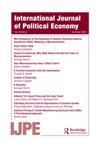Poles Apart? Alternative Welfare Trajectories under Finance-Dominated Capitalism
IF 1.3
Q3 ECONOMICS
引用次数: 0
Abstract
Abstract By connecting the post-Keynesian view of financialization with Comparative Political Economy, we suggest some elements for an updated interpretation of the existing models of welfare. As a main element of novelty, we consider how high-income countries are reacting to the pressures of finance-dominated capitalism, namely by extending, keeping, or retrenching their welfare systems. The contribution of the article is threefold. First, we elaborate on the nexus between welfare and financialization. Second, we introduce a multidimensional index aimed at assessing the degree of welfare of 32 OECD countries for the period 1990–2015. Third, we compare our index with the socio-economic models identified in the literature and with the patterns of financialization. Two trajectories emerge from our exploration: on the one side, Scandinavian and Continental European countries moved toward relatively higher levels of welfare; on the other side, lower levels of welfare feature Anglo-Saxon, Asian, Mediterranean, and Central and Eastern European countries. Besides such divergence, we find that the process of financialization was more intense in countries with stronger welfare, which likely opted for a compensation strategy. Our work highlights the relevance of policies and institutions in shaping different welfare systems and coping with the challenges of the current phase of capitalism.两极分开?金融主导资本主义下的另类福利轨迹
摘要通过将后凯恩斯主义的金融化观点与比较政治经济学联系起来,我们提出了对现有福利模型进行更新解释的一些要素。作为新颖性的一个主要因素,我们考虑高收入国家如何应对金融主导的资本主义的压力,即通过扩大、保留或紧缩其福利制度。这篇文章的贡献有三个方面。首先,我们阐述了福利和金融化之间的关系。其次,我们引入了一个多维指数,旨在评估1990-2015年期间32个经合组织国家的福利程度。第三,我们将我们的指数与文献中确定的社会经济模型和金融化模式进行了比较。我们的探索产生了两条轨迹:一方面,斯堪的纳维亚和欧洲大陆国家的福利水平相对较高;另一方面,盎格鲁撒克逊、亚洲、地中海以及中欧和东欧国家的福利水平较低。除了这种分歧之外,我们发现,在福利更强的国家,金融化进程更为激烈,这些国家可能选择了补偿战略。我们的工作强调了政策和机构在塑造不同福利制度和应对当前资本主义阶段挑战方面的相关性。
本文章由计算机程序翻译,如有差异,请以英文原文为准。
求助全文
约1分钟内获得全文
求助全文

 求助内容:
求助内容: 应助结果提醒方式:
应助结果提醒方式:


